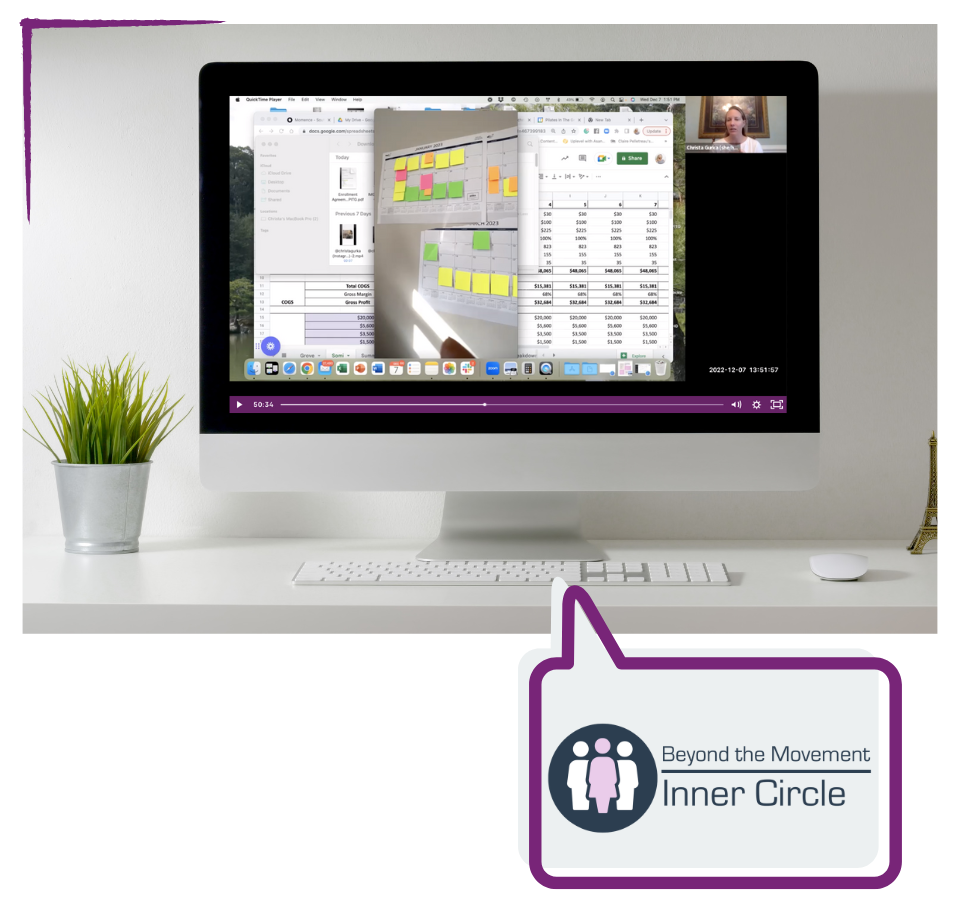Clinician to CEO
Feb 15, 2023
From Clinician to CEO: Make the Move in Less Than a Year
You’re ready to grow your business and step back from day-to-day operations. So how do you do it?
It doesn’t happen overnight, but you can do it in less than a year — as long as you have a game plan.
So what are the steps between client care and executive oversight?
Clinician to CEO: Rethink your role in client care
As a fit biz owner, you’ve probably most of your time interacting directly with your clients. Teaching classes, providing one-on-one care, even dealing with customer complaints — all of that is client care.
And it can be hard to step away from that and trust your team to take care of your clients.
But to be an effective CEO, you need to change your perspective on client care.
As an executive, your daily work isn’t about assessing a client and building a treatment plan. A CEO is a leader — your daily work centers on finding ways to inspire and motivate your team to work together to achieve your vision.
You’re still doing what’s best for your clients. But you’re approaching it as a high-level director instead of a one-on-one clinician.
Learn new skills
Another critical step is reevaluating your skill set.
Most of the skills that make you an excellent instructor and technician aren’t the ones you need as an executive. Being a clinician is about evaluating a client’s movement, diagnosing their issues, and designing an effective care plan. You’re making decisions that affect one person or a small group of people.
But as an executive, you’re leading a team, building a cohesive group that follows your vision for your business. That means developing strong leadership skills:
- Collaboration
- Innovation
- Listening
- Influencing
- Communicating
As a clinician, you spend most of your time talking to clients and giving them information. But as a leader, you need to switch that — spend more time listening than talking.
You can’t just talk over your team all the time and try to lead by overpowering them. Your job is to listen and then lead through influence.
Build a healthy team environment
Being a leader also means developing realistic expectations for your team. This is especially important if you’re a perfectionist — and why I’d encourage you to ditch perfectionism like I have. Insisting on perfection from your team creates a toxic work culture and inevitably leads to high turnover.
You can have high expectations for your team as long as you’re supporting them — treating them like people and not running them into the ground.
Creating a healthy environment means owning up to your mistakes. Having high expectations isn’t the same as being a tyrant, and you must understand that difference if you want to build a loyal team.
Fix yourself first
Want to know one of the best things I did to improve my leadership skills? Therapy.
Self-awareness is crucial if you want to be an effective CEO. But it’s not something many of us have naturally. And most of us don’t know we lack self-awareness — because if we knew that, we’d have some self-awareness! (Want a great book on self-awareness? I always recommend Insight by Tasha Eurich)
So unless you know you’ve already done the work to build your self-awareness, assume that you don’t have it and make a plan to fix it.
Go to therapy.
Find a coach.
Get a mentor.
Put yourself in a position to learn from people who can give you objective feedback and constructive criticism.
And that means other executives, CEOs, or leaders. You need a place to interact with other leaders who can understand the unique challenges of the role.
Find a space where you can talk about your team members and get advice and feedback (because you absolutely shouldn't be talking about team members to other team members).
Create healthy boundaries
You are not your business. And your business is not you. It’s crucial to separate yourself as a person from yourself as an executive. If an employee quits or a client leaves, that’s a reflection on your business, not on you personally.
Likewise, if you have to reprimand an employee and they take it badly, that’s on them. You’re responsible for being clear, concise, and respectful. But you aren’t responsible for other people’s emotions.
And remember that no one will care about your business as much as you do. Even if you’re an excellent CEO with a team that’s on board with your vision, none of those individuals will treat your business the same way that you do. Don’t expect yourself in your team members.
Be patient with yourself
Growing your CEO skills is a slow and steady process. It requires you to be honest with yourself and vulnerable with others. It’s a tough job — and that’s why many people choose not to do it.
But it’s absolutely something that you can do. And when you decide it’s time to step into that role, do what you need to be successful. Learn new skills, create healthy boundaries, and work on yourself.
Remember, being an executive isn’t about having power over others. It’s about having influence with your team. It’s walking toward your vision and encouraging your team to follow you.
Ready to take that next step? I’d love to help! Consider joining my Beyond the Movement Inner Circle mentorship program.

The Inner Circle provides support and direction for female physical therapists and boutique fitness entrepreneurs. My goal is to help you create predictable 6-figure revenue while cutting your client-facing hours in half.
Enrollment opens soon, so now is the perfect time to get on the waitlist.
Lorem ipsum dolor sit amet, consectetur adipiscing elit. Cras sed sapien quam. Sed dapibus est id enim facilisis, at posuere turpis adipiscing. Quisque sit amet dui dui.
Stay connected with news and updates!
Join our mailing list to receive the latest news and updates from our team.
Don't worry, your information will not be shared.
We hate SPAM. We will never sell your information, for any reason.


